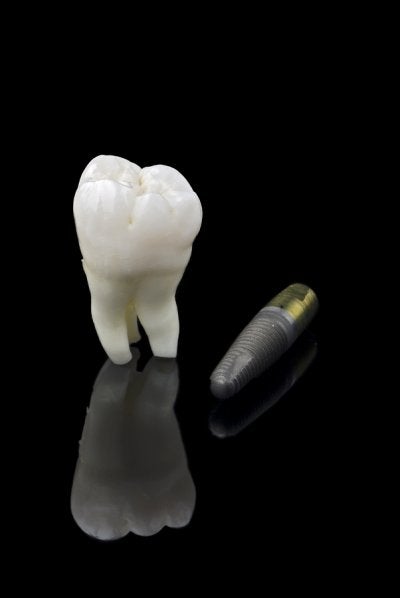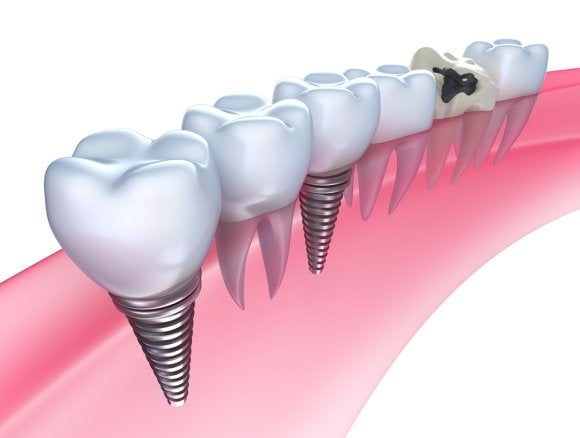-
A Look at the Dental Implant Procedure
Dental implants have already helped people all over the world find a permanent solution for their problems with missing teeth. If you and your dentist in Glenview have decided that dental implants can help you, use this guide to learn more about the procedure and what to expect from it:
Taking a Visit to the Dentist
Once you officially decide to get dental implants, your dentist will most likely perform the procedure in his or her office. Most patients only need local anesthesia, but there are other available sedation options like nitrous oxide or intravenous sedation. The dental implant procedure requires a few different visits so you can give the gums enough time to heal in between getting the implant and the replacement tooth.
Placing the Implant
The first step to the procedure is to place the implant beneath the gum. The implant will serve as a new tooth root. Once it is placed, the area around the implant needs some time to heal before the dentist can move onto the next step of the procedure.Attaching the Abutment
Once the dentist is sure that the implant has officially healed, he or she can attach a post, known as an abutment, which extends into the mouth. The gum needs time to heal around the abutment before the dentist can finish the procedure with the replacement tooth.Completing the Process with the Replacement Tooth
While the gum heals around the abutment, your dentist will probably advise you to stay away from chewing on hard food. As soon as the area is healed, the dentist will attach custom replacement teeth on to the implants to restore the aesthetic appeal and the function of your smile.As long as you are in good overall health, have enough jawbone, and do not have any major oral issues like periodontal disease, you could be a good candidate for dental implants. Talk to your dentist about the implant procedure to find out if it might be the right solution for you.
-
The Benefits of Dental Implants
When you have missing teeth, it’s important to discuss your tooth replacement options with your dentist. Leaving a gap where you’ve lost a tooth can have serious repercussions for your long-term dental health, including deterioration of bone and damage to remaining teeth. Dentures and bridges used to be the only alternatives for replacing missing teeth, but now dentists are turning to dental implants more and more for better results and greater patient comfort. Talk to your Glenview dentist about whether implants are the right choice for you, and as you weigh your options, keep these benefits in mind.

No Slippage
One of the biggest issues faced by denture wearers is the way dentures can slip around in the mouth. In addition to impacting your self-esteem—making you constantly concerned that people will see your dentures moving—slippage can irritate your gums and affect how you eat and speak. With dental implants , there’s no risk of slippage. The implants are anchored in your jaw with artificial tooth roots, so they stay in place just like your natural teeth.No Damage to Neighboring Teeth
When you have natural teeth remaining, instead of a full denture, your dentist can replace the missing teeth with a bridge. The trouble with a bridge is that it relies on your natural teeth for support. Over time, the bridge can weaken those teeth, cause toothache, and even deteriorate teeth to the point that extraction is required, necessitating another bridge. Dental implants are supported by artificial roots that fuse with your jaw, not any other teeth. None of your remaining teeth are damaged by dental implants.No Special Care
Dental implants look like natural teeth, and you can care for them the same way. Simply brush, floss, and have regular check-ups with your dentist, and your implant should last indefinitely. Dentures require special cleaning daily, and over time, as your mouth changes, you may need adjustments to your dentures so they continue to fit. -
Why You Should Decide on Dental Implants [INFOGRAPHIC]
Missing teeth are bad news for your dental health. When you’ve lost teeth, you leave your gums vulnerable to irritation and your remaining teeth at risk for shifting and falling out. While dentures and bridges used to be the only options for people with tooth loss, a newer solution is becoming the gold standard for tooth replacement: dental implants. With dental implants, you don’t have to worry about many of the problems that accompany dentures, like special care requirements and slippage that causes speech and eating difficulties. Dental implants look and act like your natural teeth, and they don’t require special attention. No one will know you’ve got an implant except you and your Glenview dentist . Learn more about dental implants in this infographic from DentiStar. If you have friends and family members who are dealing with tooth loss, share this information with them so they can talk to their own family dental care providers about their treatment options.

-
How to Care for Your Dental Implants
Dental implants have many advantages, but one of their biggest boons is that they do not require the same kind of special care as dentures and bridges. With minimal attention, dental implants can last a lifetime. Having regular check-ups with your Glenview dentist is an important part of dental implant maintenance. Here is what else you need to know.
Dental implants are rooted in your jaw and don’t rely on natural teeth for support. They look and feel just like your natural teeth—no one will know you have a dental implant but you. You can also care for them as you would your natural teeth. Brush and floss your dental implant as you do your other teeth, and you will be able to keep it clean and healthy. Although dental implants can’t get cavities, you can get gum disease around the implant, so have regular cleanings and checks-ups to keep gum issues at bay. This easy care routine will make your dental implants last indefinitely.

